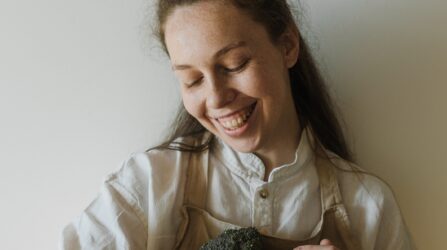Hormona Library
Our Library is packed with personal stories and in-depth research-
based features, alongside the latest medical and scientific discoveries
in the worlds of hormone and reproductive health.
Our Library is packed with personal stories and in-depth research-
based features, alongside the latest medical and scientific discoveries
in the worlds of hormone and reproductive health.

Understanding hormonal changes in women over 40 and their impact on health Starting around age 46, hormonal changes cause women to enter perimenopause. This stage is the transitional period that leads up to postmenopause and includes numerous symptoms like hot

What happens to your hormones after one drink? You may be surprised to learn that there’s a direct link between alcohol and hormones, since it’s a connection not many people talk about. Alcohol’s impact on the endocrine system and adrenal

What causes bloating during ovulation? Ovulation bloating is not common, since ovulating doesn’t cause constipation, or gas. However, while bloating isn’t caused by ovulation, you could experience mittelschmerze, or ovulation pain, on the side of your abdomen where the ovary

Understanding progesterone and its impact on your mood and body As we mentioned above, progesterone is one of the main female sex hormones. This hormone is responsible for thickening the lining of the uterus to support a fertilized egg. During

What are vaginal spasms? A vaginal spasm is an involuntary muscle spasm in vagina or the surrounding pelvic floor. While it’s widely believed that this condition only affects between 1 to 7% of women. Women who experience these muscle twitches

Understanding normal variations in vaginal appearance Typically, when we ask, “What does a vagina look like?” we’re thinking about the vulva, which is the word describing all the external genitalia associated with vaginas. Healthy normal vulva skin can range in

Does ovulation make you more horny? When considering the question, “Does ovulating make you horny?” the answer comes from the body’s biological functions during the menstrual cycle. As we touched on earlier, there are two phases in a woman’s menstrual

Types of IUDs IUDs or intrauterine devices are contraceptives that are inserted into the uterus to prevent pregnancy. They work by either releasing copper to create an inhospitable environment for sperm or progestin to thicken cervical mucus, and thin the

What vaginal discharge colors mean for your health Understanding vaginal discharge colors and meaning is essential for every woman at every stage of life. While some colored discharge may indicate infections, others are normal. White and clear The first discharge

Understanding perimenopause and menopause When talking about perimenopause versus menopause, it’s easy to confuse these two stages. Perimenopause is the transitional period when you move away from your peak fertility and your ovaries gradually stop releasing eggs. In turn, menstruation

Understanding perimenopause and its symptoms When it comes to aging, many women know about menopause but are surprised to learn about the transitional stage leading up to it, called perimenopause. There are three stages of perimenopause: early, late, and menopause,

Sugar cravings are something many people experience, and they can pop up for a few different reasons. One of the most common reasons is simply habit – if you regularly eat sugary foods, your body starts to expect them. Another

The basics of progesterone – What is it? In the menstrual cycle, the two most important sex hormones are estrogen and progesterone. But what is progesterone hormone and what does it do? Progesterone is a steroid hormone. So, what is

What is estrogen and why is it important? Estrogen is one of the main sex hormones responsible for menstrual cycle regulation. It prepares your uterus for pregnancy and affects breast tissue development. But it isn’t just your reproductive system that

Perimenopause and fertility: What you need to know After mid 40, many women start the transition to menopause, this stage is called perimenopause. This is the time when your hormones start to behave differently and fertility decreases. Whether you already

The role of hormones in perimenopause Throughout your menstrual cycle, you experience normal hormonal fluctuations that are responsible for proper bodily functions like ovulation and menstruation. However, once you enter perimenopause, your hormone fluctuations change. As ovaries become less responsive

What is PMS fatigue? Have you ever wondered, “Why am I so tired before my period?” If you have, you’re not alone. Around 80% of women say that they experience some PMS symptoms, including having low energy before period onset,

Understanding PMS symptoms without menstruation Before we proceed with explanations, we wanted to clarify why having PMS symptoms is not the same as being diagnosed with PMS. As we’ve already mentioned, PMS stands for premenstrual syndrome. This syndrome is diagnosed

Understanding PMS vs. pregnancy symptoms Before we proceed, please keep in mind that during a normal menstrual cycle, you may experience symptoms; however, they should be mild and not interfere with your daily life. This is a common and normal

The importance of the follicular phase While it may not be the most fun part of the menstrual cycle, the follicular phase plays a key role in your reproductive health. As we mentioned, the follicular phase begins on the first

Understanding female hormones If you’ve never heard that women have specific feminine hormone levels, you’re probably wondering, “What are the female hormones and how many hormones do women have? Female hormones are hormones released in higher concentrations in a woman’s

Understanding estrogen and its role in pregnancy Estrogen is one of the most important sex hormones, impacting every part of the fertility process. During your menstrual cycle, estrogen levels influence LH production, which triggers ovulation. While progesterone is responsible for

What are PMS and PMDD? Whether you’ve just started your period or have had it for years, you’ve probably experienced some physical symptoms and mood changes before it began. While you may have heard of PMS, most likely not in

What is estradiol? Estradiol is a type of estrogen that’s produced primarily from the ovaries but in lesser amounts by the adrenal glands and fatty tissue. As one of the primary sex hormones, it plays a key role in regulating

Your period: The lowdown When it comes to menstruation, there aren’t different period stages, because your period is actually a part of the follicular phase. If you’re confused, don’t worry; we’ll explain more. For many women, the wording is where

If you were a teenager who suffered from hormonal acne, you know how challenging it can be. You probably couldn’t wait to become an adult and watch your skin transform, leaving those stubborn breakouts behind. Unfortunately, millions of women continue

What is cycle syncing? Cycle syncing or cycle eating aligns your lifestyle habits, like exercise and diet, with the different stages of your menstrual cycle. As women, our bodies have different monthly requirements to support healthy hormones. When we don’t

What is hormonal imbalance? It is a simple way to say that your hormone levels are significantly higher or lower than what is expected for your age and the time of testing. Keep in mind that it is not a

Understanding the female libido Before we can answer, “Does progesterone increase sex drive?” it’s important to gain a better understanding of what a “sex drive” means. The female libido or sex drive is how much you desire sexual activity. Every

Why am I so hungry before my period? Women who experience an increased appetite before period starts can feel frustrated that they’re craving foods they don’t normally eat. You may be wondering, “Why do I eat so much before my
| Cookie | Duration | Description |
|---|---|---|
| cookielawinfo-checkbox-analytics | 11 months | This cookie is set by GDPR Cookie Consent plugin. The cookie is used to store the user consent for the cookies in the category "Analytics". |
| cookielawinfo-checkbox-functional | 11 months | The cookie is set by GDPR cookie consent to record the user consent for the cookies in the category "Functional". |
| cookielawinfo-checkbox-necessary | 11 months | This cookie is set by GDPR Cookie Consent plugin. The cookies is used to store the user consent for the cookies in the category "Necessary". |
| cookielawinfo-checkbox-others | 11 months | This cookie is set by GDPR Cookie Consent plugin. The cookie is used to store the user consent for the cookies in the category "Other. |
| cookielawinfo-checkbox-performance | 11 months | This cookie is set by GDPR Cookie Consent plugin. The cookie is used to store the user consent for the cookies in the category "Performance". |
| viewed_cookie_policy | 11 months | The cookie is set by the GDPR Cookie Consent plugin and is used to store whether or not user has consented to the use of cookies. It does not store any personal data. |
